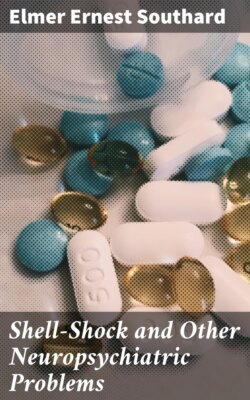Читать книгу Shell-Shock and Other Neuropsychiatric Problems - Elmer Ernest Southard - Страница 66
На сайте Литреса книга снята с продажи.
ОглавлениеResponsibility of a drunken epileptic.
Case 58. (Juquelier, March, 1917.)
The question of responsibility arose in the case of a soldier who left his camp the morning of October 23, 1916, and went to a neighboring place, where he drank, with four others, two quarts of wine. At about three o’clock in the afternoon, his captain met him on the street, lost, and looking drunk. He told him that he would send him to the trenches in the evening. The man lay down and went to sleep. At about six o’clock, it was found that he could not put on his equipment alone, and in fact threatened the other men with his bayonet, and then went to sleep. He woke up and explained that he had had one of his nervous crises. He remembered the matter of the bayonet but had forgotten everything else about the struggle.
This soldier was 29 years old, the son of an alcoholic, and the ninth child of a mother who died shortly after her tenth pregnancy. He had had measles and bronchitis as a child, and in childhood had had bad dreams; at the age of ten he had swooning spells. He became a quarryman and a habitual drinker, subject to dyspepsia, nightmares, and nocturnal cramps. There had never been any crises, however, up to wartime.
January, 1916, when a shell burst near him, the first sharply-defined epileptoid crisis came, and was followed by a number of others, either on leave or on service, March 8, June 2, and July 13. These attacks showed a sudden fall without warning, loss of consciousness, convulsions, tongue biting, incontinence of urine, a period of more or less coördinate agitation at the time consciousness was reappearing, sometimes a fugue, and often amnesia for the whole. He had a scar on the left border of the tongue.
Should this epilepsy be regarded as entailing irresponsibility? He left camp before the crisis, accordingly in a period when he was in full possession of consciousness and will, and he had gotten into an irregular situation by drunkenness before his epileptic crisis started in. His struggle with his comrades, however, appears to be a portion of a post-critical dazed state. The medicolegal decision, therefore, was that he was guilty of leaving his command but not of the other misdemeanor. Considering the general nature of epilepsy, the responsibility of this man for the whole adventure is rather slight. The Council, however, condemned the man to five years of labor, without admitting that the crisis following so soon the actual misdemeanor should argue a diminution of responsibility.
Re epilepsy in the army, Lépine notes the serious theoretical and practical problems to which it gives rise. In the first place, epilepsy occurs in the army more frequently than in the same number of men in civilian life. Consequently, the diagnosis as to the really epileptic nature of the attacks observed is not too easy. Again, the situation affords much opportunity for simulation (see, for example, the case of sham fits (Case 78, Hurst), and the case of epileptoid attacks controllable by the will (Case 79 of Russell)). Wounds may produce it, and even wounds which do not affect the brain; besides which, a variety of war conditions, short of trauma, may produce it. When the ordinary impulsiveness of the epileptic turns into automatism and to epileptic equivalents (états seconds), much of medicolegal interest may happen. Case 58 was just short of a murderer. Cases of actual murder in epileptic equivalents have been known under military conditions. Fugues with amnesia for the phenomena (which look to the military man like intentional desertions) form another group of epileptic events; but aside from the manias and the fugues, there are still more dubious epileptoid phenomena of a delusional and confusional nature, such that the proof of epilepsy comes only afterward, when frank convulsions supervene. Re fugues and desertion (the most frequent of military delinquencies according to Régis), we may think of the fugue reaction, according to Lépine, as a natural reaction on the part of both the true delinquent and the mentally sick subject. The loss of liberty, alcohol, fatigue, minor phenomena of commotio cerebri, may lead to states of mental depression that favor the fugue. It is an affair of the greatest delicacy for the expert to build up again the exact plight of the soldier at the time of his desertion. Special inquiry must be made of the man’s mates. Only in this way can the wheat be separated from the chaff and punishment allotted to those only who deserve it.
According to Lépine, there are fewer guilty fugitives than there are innocent ones, or at least partially innocent ones. In the decision, one takes account of the duration, the course, and the peculiarities in the termination of the suspicious flight. According to the military code, there are cases like Case 58 in which the fugue itself was carried out in an unconscious state, and yet in which the martial responsibility of the man was absolute. Drunkenness is no excuse for the fugue, even if the latter is automatically carried out. Of course, the paretic is not responsible for his fugue any more than the organic dement, the delirious uremic, or the chronic alcoholic, who is already severely demented. For a case of this sort, see Case 1 (Briand).
In the differential diagnosis, we must also consider that fugues may be carried out in confused states as well as at times in various paranoid states, and even in melancholia.
